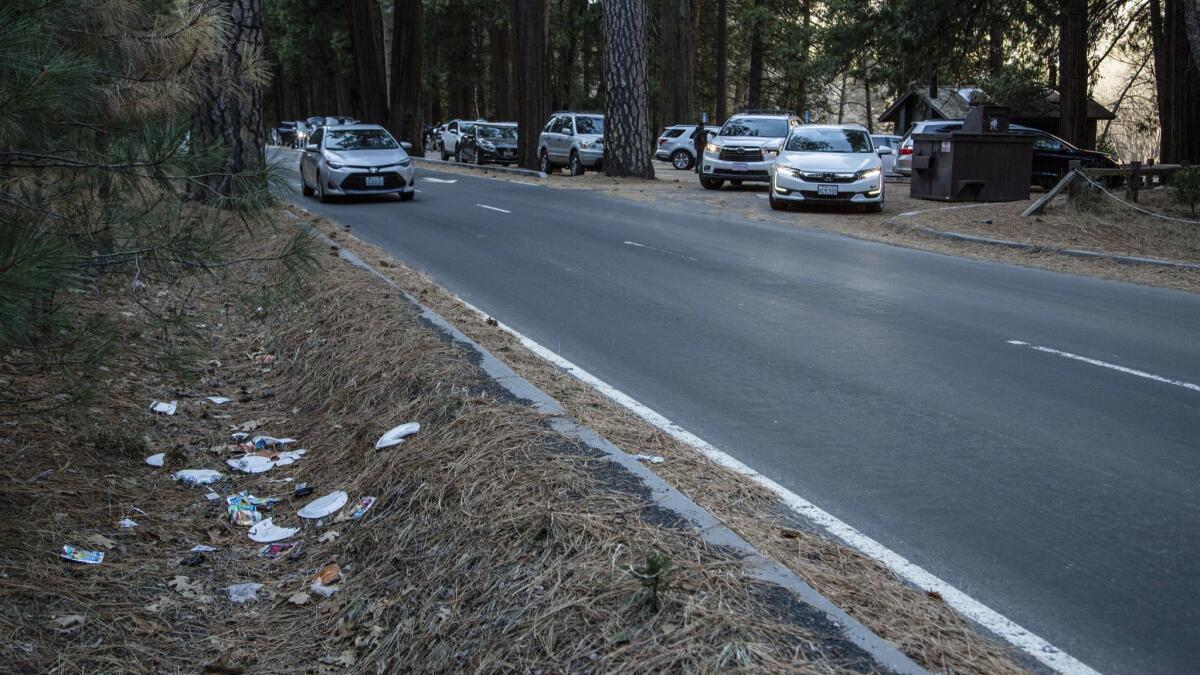Editorial: Americans may love their national parks, but they can’t be trusted to enjoy them unsupervised

As the federal government shutdown approaches the two-week mark, it’s become painfully apparent that the public can no longer run amok virtually unsupervised in the national parks.
What’s the evidence of that? The litter, vandalism and trampled ground. The human feces overflowing the public toilets and the urine along the roads.
Unlike the last lengthy shutdown in 2013, the Trump administration this time has opted to keep the national parks open but largely unstaffed. Private concession operators and nonprofit foundations have helped with maintenance where they can. Some states, including Arizona and New York, have dipped into their own coffers to keep parks staffed and operating — at least for a while. Many other states, including California, have not.
With tens of thousands of park employees furloughed, that means many parks have no workers collecting entry fees at the gates, patrolling the campgrounds or emptying the garbage cans and portable toilets. But the visitors keep coming.
The nation’s most magnificent public assets shouldn’t be sacrificed to this political battle.
The lack of maintenance and oversight is taking a toll. There are reports of illegal camping and off-road driving in sensitive habitat areas. Unsupervised tourists were harassing elephant seals at the Point Reyes National Seashore, prompting officials to close off part of the beach.
Visitors have posted pictures on social media of overflowing garbage bins. Empty champagne bottles were left strewn on the ground at Joshua Tree. Yosemite officials had to restrict entry to certain areas of the park after the accumulation of human urine and feces became a health hazard.
The National Park Service has the authority to turn away visitors for safety, health or environmental protection reasons. That’s what the Sequoia and Kings Canyon National Parks did Wednesday, when they closed large sections because of concerns that visitors could be endangered on icy roads and hiking trails.
And the threat isn’t just to the natural wonders and to public safety. The national parks are full of cultural and historic resources that could be damaged or stolen with so little oversight and protection.
During the 2013 shutdown, the Obama administration ordered the national park system completely closed. That was a controversial decision at the time. Visitors who had traveled great distances to visit these public treasures were turned away. Local businesses that rely on park tourism suffered. Others saw the closures as a political tactic by President Obama to drum up negative publicity for the Republican-led shutdown.
But given the damage currently being inflicted on the nation’s most majestic open spaces, temporarily closing some parks might be the best way to protect them.
Indeed, as one former National Park Service director said, keeping the parks open but unstaffed is like leaving the Smithsonian open without employees minding the priceless artifacts. It invites abuse and practically guarantees damage to some of the national’s most treasured public lands.
Enter the Fray: First takes on the news of the minute from L.A. Times Opinion »
Yes, it’s a loss to the tourists who planned their vacations around a visit to Yosemite Valley, or who had hoped to hike through the forests of Sequoia National Park. Yes, there will be an economic cost for local communities. But that is the cost of a government shutdown. The political stalemate in Washington — the failure of President Trump and congressional leaders to reach a budget deal as they haggle over his insistence on a costly border wall — has real-world consequences.
The nation’s most magnificent public assets shouldn’t be sacrificed to this political battle.
It’s worth noting that the national park system already struggles with an $11-billion backlog of deferred maintenance and with massive crowds that stress existing capacity. There are potholed roads, crumbling trails, aging sewer systems in need of repair to prevent contamination of nearby streams. Throwing open the gates to all comers with little control or oversight only exacerbates those problems.
Americans may love their national parks, but they don’t always treat the parks with the care they deserve. The parks should shut down until the federal government reopens.
Follow the Opinion section on Twitter @latimesopinion and Facebook
More to Read
A cure for the common opinion
Get thought-provoking perspectives with our weekly newsletter.
You may occasionally receive promotional content from the Los Angeles Times.










